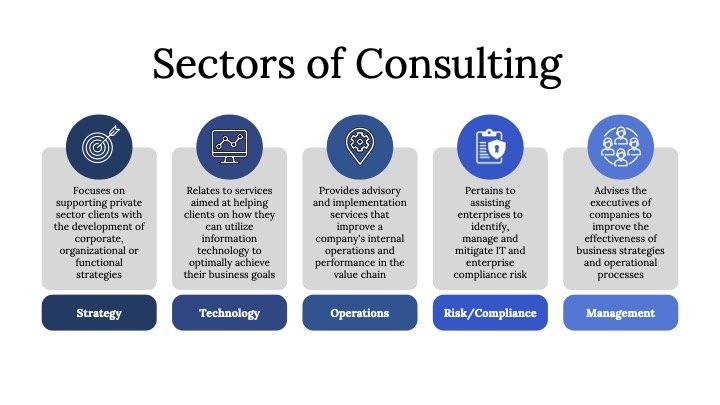An official definition of consulting is an individual who works closely with business owners and managers to improve operations and efficiency. This includes helping to identify, address, and overcome obstacles to meeting a company’s goals. However, consulting covers a wide variety of positions, and one consultant's responsibilities could have very little similarity to another consultant. In order to fully understand consulting roles and the various opportunities at consulting and accounting firms, it is important to recognize the differing qualifications, fields of expertise, and day-to-day obligations. In order to simplify a complex topic, we will focus on consulting roles at the Big 4, Big 3, and midsize firms. Roles at these firms can be separated into several categories. accounting-based consulting, financial consulting, technology consulting, and strategy consulting. The four categories of consultants are usually assigned to pre-merger, post-merger, or company optimization projects. These four categories and three project types, and sometimes a combination of them, will make up the majority of the consulting roles that students apply to.
Accounting-based Consultants
Accounting-based consultants are almost always CPA certified and have an accounting degree or background. Pre-merger accounting-based consultants are often in groups like Transaction Advisory, where before a merger, Company A will hire these consultants to make sure that the accounting records and procedures of Company B are up to par. These consultants will ultimately advise Company A on whether the acquisition is worthwhile given the state of Company B’s accounts. For post-merger consultants in this field, the work is different. Oftentimes, after an M&A between two companies, their accounting processes and technologies are at odds and must be consolidated into one system. Accounting-based consultants in this practice are tasked with creating a uniform system for the post-merger company and dealing with all of the complications that arise. Company optimization consultants in this practice are brought in when a company knows that its accounts are weak or underperforming, and rely on the consultant's expertise in accounting to optimize their accounts and re-balance the book. These consultants are usually brought in to help with accounting operations across the board.
Financial Consultants
Financial consultants usually have a financial background, such as a Finance major or prior experience in the field. Additionally, these consultants will look for creative yet realistic areas for financial expansion. All three roles require in depth understanding of financial principles and the ability to relate that information to company executives. Pre-merger financial consultants may be in a practice such as Financial Due Diligence (FDD) analyzes the financial statements and reports of a company and their target acquisition to analyze a potential acquisition from strategic and practical perspectives. Post-merger financial consultants may be in roles such as M&A Advisory and are generally consulting clients on how to create a financially profitable organization after acquiring another company. Optimization financial consultants will be hired by a company that is not in an M&A process, and is instead looking for areas of the company that can be improved, expanded, or if needed cut out.
Tech Consultants
Technology consultants usually major in MIS, Data Analytics, or a related tech focused field. Technology consultants are perhaps the most varying consultants, but generally focus on how a company can utilize technology advantageously. Pre-merger technology consultants are not so common, but generally analyze a potential acquisition’s technology interface and capabilities. They consult a client on whether a different company is a strong technological asset, or will require intensive resources to get the new company up to standards. Post-merger technology consultants usually focus on strategic or actual implementations of technology to either or both of the M&A companies. This involves not only an understanding of technology but the ability to explain the technology to executives in an understandable way. Optimization technology consultants analyze a company’s technology and look for areas of improvement. They often then work on actually implementing the technology and working hand-in-hand with the client to make sure that nothing goes wrong.
Strategy Consultants
Strategy consultants are typically in companies that have specific consulting divisions, such as the Big 3, EY Parthenon, PwC, and Accenture to name a few. Strategy consultants work with clients for a long period of time to help them with their tasks. They conduct extensive research and consider the client’s goals, ideas, and current strategy. Through this they will offer solutions and work directly with the client to help alleviate/improve the situation. They create strategy’s that clients will follow to do better in their industry, and provide constant support and are heavily involved. Pre-merger strategy consultants will look at the broader scope of potential acquisitions and analyze what companies would be strategically advantageous in an M&A. Post-merger strategy consultants analyze how a company can move forward and what a 5 or 10 year roadmap looks like. Optimization consultants will look at the company’s overarching strategy and highlight weaknesses and areas of improvement.
What is the Big 3?
The ‘Big 3’ is a term used to describe the top 3 management consulting firms in the world. These firms are McKinsey & Company, Boston Consulting Group (BCG), and Bain & Company. These firms generally have the highest paying jobs in the management consulting field and are the most exclusive in their recruitment efforts. Despite their prestige, the Big 3 firms are each many times smaller than the Big 4 firms.
What is the Big 4?
The ‘Big 4’ is a term used to describe the top 4 accounting firms in the world. These firms are PricewaterhouseCoopers (PwC), Ernst & Young (EY), Deloitte Touche Tohmatsu Limited (Deloitte), and Klynveld Peat Marwick Goerdeler (KPMG). Even though the Big 4 are accounting firms, each has consultancy branches. Outlines of the Big 4 are listed below:
PwC
As a member of the Big 4, PwC (PricewaterhouseCoopers) offers many job opportunities for consulting, audit, tax, and assurance. PwC has an active initiative to improve and implement technology into its consulting and audit divisions. PwC is one of the biggest SOM student recruiters and offers many leadership programs and summer internships, that can be leveraged into full time offers. They have expanded their tech consulting into involving cybersecurity and cloud/digital technologies.
EY
As a member of the Big 4, EY has an extremely large presence on Binghamton University’s campus, and is one of the biggest recruiters for SOM students interested in audit, advisory, and consulting. EY recruits many accounting and business administration majors, and recruits many graduates for its consulting services. EY Parthenon is a subsidiary of EY that focuses on global strategy consulting for international clients. EY Parthenon is typically very selective. EY has had a focus on technological advancement for the last decade, and having a plethora of technical skills will provide increased opportunities in the company.
Deloitte
As the largest of the Big 4, Deloitte has a wide range of opportunities for consulting jobs. Deloitte recruits out of Binghamton for positions within their Risk and Financial Advisory (RFA) practice. As an advisory practice, the general projects that the consultants will work on will usually be longer in duration than traditional consulting roles. The main roles within the RFA practice are their Cyber and Strategic Risk, Technology, Internal Controls, and Data Analytics divisions. Evidently, Deloitte’s Risk and Financial advisory practice is more technologically focused, but can still appeal to those who want some level of financial involvement.
kpmg
As the smallest of the Big 4, KPMG’s consulting practice recruits out of Binghamton for several positions.

